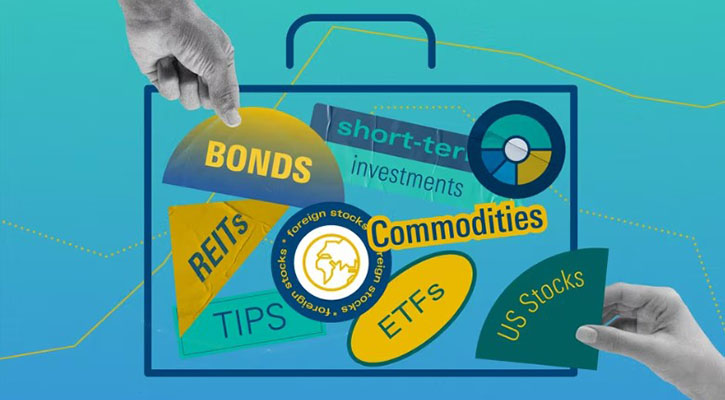Christian Charest: For Morningstar, I'm Christian Charest. This week on Morningstar.ca, we are looking at Morningstar's best ideas for different areas of the investment world. Today we have Bob Johnson, Morningstar's Director of Economic Analysis, who is going to share with us his thoughts on what's in store for the world economy.
Bob, thanks for being with us.
Bob Johnson: Great to be here today.
Charest: Great. Now let's start with the U.S. economy. It's the biggest in the world and you've described it as an ocean liner, in the sense that it's slow-moving, it's kind of hard to speed up, slow down or change direction. What exactly do you mean by that?
Johnson: Sure. For the last three years, the economy has grown at about a 2% to 2.5% growth rate, and it's been kind of rock-solid year after year. We see some monthly data, looks like, oh, we added 50,000 jobs and we added 200,000 jobs in one month, or in one quarter we get 0.1% GDP, another we get a 4% GDP.
But when you look at the data over a full year and average all of it together and look at the last three or four years, it's been an incredibly stable economy, with little variance off of the trend, 2% to 2.5% growth rate. And the real way you could tell is to look at employment growth in the private sector in the U.S., which has been rock-solid at 2% again over those same three or four years.
And then you look at consumption, also very steady at just over 2% in year-over-year growth. So it's really been a stable economy. We have had a lot of bad things and a lot of good things happen during that time and yet it's very hard to shift that direction. We have had the tsunamis that did in our auto industry. We had Hurricane Sandy that shut down things on the East Coast. Now we have an incredibly bad weather situation and through it all -- and higher gasoline prices and the Arab Spring -- all those things, whatever you throw at it, we seem to keep bouncing back.
But it's also equally as hard to get that number to accelerate any, because everything is happening a little bit at a time, not all at once. The housing gets strong and then gets a little weaker, manufacturing gets stronger and then it get a little weaker, retail gets stronger and it gets weaker. We aren't putting it together on all cylinders at the same time nor do I think we necessarily will.
Charest: Now your forecast is actually slightly more pessimistic than what other economists forecast, the consensus seems to be around 2.7, yours is at around 2.5.
Johnson: Yes. But maybe even a tad lower than that. Yes. I think that a lot of people are very optimistic and I share some of that optimism. That last year, the government spending really hurt in the U.S. Bernanke, the ex-Fed Chairman, has gone around saying that, you know what, all the fiscal things that we did, the higher taxes, the higher payroll tax, some of the new taxes, all hit the economy to the tune of 1% to 1.5% of GDP. And so a lot of you will say, we grew about 2% last year, I add 1%, 1.5% to that and even slow that back a little, I'm still getting a pretty good number that looks like 3%.
Well, I think government's still going to be a little bit slow this year. I don't think some of the war spending we are doing is ever going to come back. I think some of the big defence budget programs aren't going to get rolling in a big way again. And I think some of the tax impacts may actually show up more this year than they did last year. I think some of the taxes actually put in place last year don't have to be paid until this April or maybe even as late as this September. So it's taken a little while for it to filter through.
Charest: You have written that the housing market is potentially the biggest driver of the U.S. economy for the foreseeable future. How healthy is the housing market?
Johnson: Yes. I think when I look at the housing market, the key metric that I'm looking at and the reason I say that, you know what, this recovery has not been a great one. It's been a slow-growth recovery. But what we've lacked in robustness, well we might get back in longevity. This could easily be one of the longest recoveries that we have had. In fact, the recovery here is already longer than five or six of the recoveries that we've had since World War II.
So we have really had a nice long recovery, but it's not very robust. And the reason is that, housing has come back so slowly. Housing is now about 3.1% of GDP. It's up from 2.5%, so it's improved. But in a typical period it would represent something more like 4.7% and 4.8% of our GDP rate. And in boom times it might be as much as 7% of GDP.
So I like to say that housing has a lot of runway room in front of it. We have got a long way to go. That doesn't mean that we aren't going to have some bumps in the road, we will, and in fact right now, we are probably having one of those. But in the intermediate-term, housing will help drive the economy and that's a big driver of jobs.
Because it's not only the people that build the houses, it's the mortgage brokers, it's the furniture makers, it's the movers, the landscapers; there is a ton of things that go with housing and that's why we really need housing to do well. It is the absolute key to moving the economy forward from here.
Charest: Now let's switch over to China. We've been writing a lot about the transition over there, over the past couple of years from an economy that's based a lot on capital spending to one that's more consumer-driven. The economy seems to be slowing down right now. What's your outlook over there?
Johnson: Yes, Christian, you've got a good point there. I think China has been slowing for some time, actually. I mean in the boom times, they were growing at kind of a 10% or 11% rate. Now that rate looks more like 7.5%, and we might suggest here at Morningstar that that rate might even be a little bit of a stretch. I think they've tried to move from an investment-oriented, export-related economy to one that's more consumer-driven. There are a lot of reasons for that.
I mean in terms of export, certainly the export partners are all getting a little upset, and if they absolutely put things to the wall, to the floor, so to speak, certainly people in Europe and the U.S. wouldn't be real happy with them and they might face some penalties. Then you've got the whole issue of an economy that's based on steel and basic materials and infrastructure building, has problems with creating a lot of pollution, and already this winter they were shut down for many days in Beijing, because the weather was so bad, the pollution was so bad that people really couldn't go outside because of all the pollution.
So, those are some reasons why they are trying to convert, and I think that they are trying to make that move, but it's been a hard one. I don't think they've really gotten the full benefits. The consumers aren't picking up all of the slack yet, and so the growth rate has slowed.
Charest: Overall, the world economy seems to be doing well though. The IMF published its forecast earlier in the year saying that it expects the world economy to grow by 3.7% in 2014, up from 3% in 2013. Where is that growth coming from?
Johnson: Almost all that growth -- surprisingly, it's a real change -- is coming from an improvement in developed markets: the U.S. and in particular, Europe. Europe has moved from being in a recession in the middle of last year to now be in recovery mode. It's not a huge number. I mean maybe they'll grow 1% this year in Europe, but that's enough to move up the growth rate, because it was a negative number for many quarters over the last couple of years.
So, certainly that's one of the big helps. Emerging markets will do better, but not that much better, and so as it turns out, we know, we all get so focused on emerging markets and we'd love to have their overall growth rates, but the growth rate in developed markets is actually improving faster right now. It's the story for 2014.
Charest: Canada doing its part as well, the expected growth is 2.2% up from 1.7% last year. Speaking of Canada, one of the main objections that a lot of Morningstar analysts seem to have when talking about the Canadian market is the housing market, the real estate market here in Canada. You see that in the analyst reports on the banks, for example, or on the REITs. A lot of people are worried about a potential bubble in the real estate market.
But the Conference Board just came out with a report in late March, saying it doesn't expect to see a bubble burst, that we're actually going to see a soft landing. There is going to be some sort of downward movement in house prices, because I think everybody agrees that it's overvalued, but it's not going to be catastrophic. What's your take on that?
Johnson: Yes. I mean, I tend to be a little bit more on the Conference Board side. I mean, there were some unique things that really caused the U.S. market to fall apart, just the really high leverage we have here. I mean, we've got 30-year fixed rate mortgages. You all tend to have shorter mortgages and that are more adjustable, and mortgages are a little bit harder to get. So you're a little bit less subject to the type of big collapses and bubbles that we tend to get here.
Yes, your prices are up a lot there in Canada, but on the other hand, rents are up and high rents tend to support a strong housing market. And so that's why I think things aren't collapsing. When you've got the ratio between what it costs to rent a house and what it costs to actually… the mortgage payments on a home, that's when you get into real trouble. We had markets and situations here in the U.S. where it was two and three times more expensive to own a home than to rent one and that was a big part of our problem.
When you've got those two pretty much in balance, as the Conference Board states, then you have much less worries. Well if you have to live somewhere, you have to live in an apartment or you have to live in a home. So when those two ratios start to balance out a little bit, you're not as much of a threat. Higher rates will not help, that's for sure, but nevertheless, I don't see a big crash coming, either.
Charest: Bob, thank you very much for sharing your thoughts with us, always a pleasure having you with us.
Johnson: Great to be here today, Christian.
Charest: Thanks. And for more on Morningstar's Best Ideas Week, please click on the links right below the video player.











:quality(80)/cloudfront-us-east-1.images.arcpublishing.com/morningstar/UUSODIGU4REULCOR35PTDS7HW4.jpg)

:quality(80)/cloudfront-us-east-1.images.arcpublishing.com/morningstar/VYKWT2BHIZFVLEWUKAUIBGNAH4.jpg)






